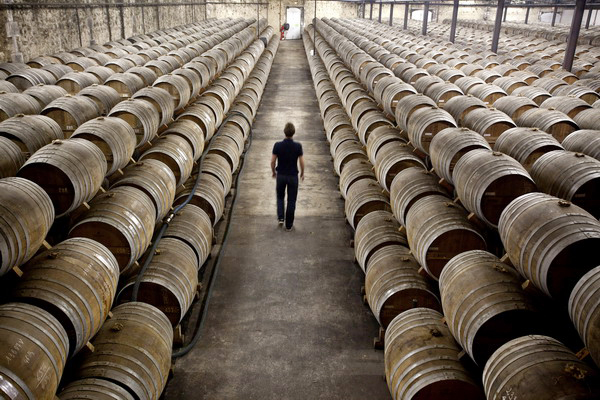

Wang said the different qualities of different types of champagne mean traders can take different approaches to explore the market.
"Compared with the massive trading model employed by red wine traders, champagne producers and traders want to maintain the premium nature of the wine," said Wang. "The price of red wine can fall extremely low. However, the price of champagne will have a bottom line."
|
 An employee walks between barrels of Remy Martin Fine Champagne Cognac, laid to age in a cellar at the Remy Cointreau SA headquarters in Cognac, France. However, Champagne - a unique sparkling wine associated with luxury and power over the centuries - has yet to receive widespread recognition and acceptance by the Chinese. [Photo / China Daily] |
In an ordinary store in China, the cheapest champagne is around 500 yuan ($80.26) per bottle. The price will be much higher in bars and clubs.
Wine market experts said the special taste of champagne is a factor that makes it less popular in China than red wine.
"Chinese people do not like the acidic taste of champagne. They also do not like wine with bubbles in it," said Vance Yang, champagne master with Le Sun Chine in Shanghai.
Federico Tabja, Chile's trade commissioner, who saw red wine exports from Chile increase 19.6 percent to 1.38 million cases (9 liters per case) in the first eight months of 2012, said Chinese people do not like drinking cold beverages. And the strong, fruity taste of champagne is relatively strange for Chinese customers.
Meanwhile, the relatively mature red wine market encourages Chinese people to choose something they are more familiar with.
"Red wine entered the Chinese market early and people are more familiar with it. Drinking red wine is trendy nowadays," Tabja said.
A market insider said one way to make the taste more acceptable is to add syrup to champagne to lower the acidity, which is providing big business opportunities to syrup providers including France-based premium syrup maker Monin.
Despite the champagne business currently being small compared with other imported alcoholic drink businesses, insiders believe the market will get mature.
"We have seen significant growth in the champagne market in the past six years and we have high expectations for the market. We want demand in the Chinese market to be as high as it is in Japan," said Wang. Japan is the largest champagne market in Asia.
Xie Yu in Shanghai contributed to this story.
tangzhihao@chinadaily.com.cn
Bottoms up! A healthy wine market
Australian wines overflow at Chinese tables
China's business taste for wine
Bordeaux to promote mid-range wine in China
China offers new hope for wine market
Home brewed wine replaces pricy liquor at govt banquet
 4th World Internet Conference concludes
4th World Internet Conference concludes
 Starbucks Reserve Roastery set to open in Shanghai
Starbucks Reserve Roastery set to open in Shanghai
 Smile to get discounts in Tmall's unmanned supermart
Smile to get discounts in Tmall's unmanned supermart
 Top 10 richest Chinese women in 2017
Top 10 richest Chinese women in 2017
 World leading internet sci-tech achievements released in Wuzhen
World leading internet sci-tech achievements released in Wuzhen
 Top tech CEOs take to the stage as Wuzhen Summit opens
Top tech CEOs take to the stage as Wuzhen Summit opens
 Major topics at 4th World Internet Conference
Major topics at 4th World Internet Conference
 'Made in China' dinosaurs amuse the world
'Made in China' dinosaurs amuse the world